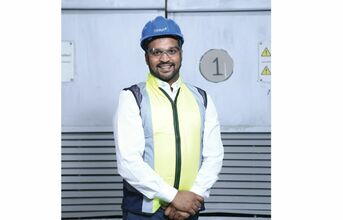
The past is often repeated by people. I have no interest. It's the evolution I favour - Unknown.
Traditionally, the manufacturing sector has always imbibed the ‘take, make, and dispose' model. In 2018, 80,000 tonnes of dross, a byproduct of aluminium, were reported to have been released into the land, subsequently impacting the ozone layer and contributing to the country's carbon footprint (source: Niti Ayog, 2018). The negative impact was massive, and I don't believe we could afford repeats, lest they come with disastrous consequences.
At a time when India stands in the top leagues among the world's steelmakers and aluminium producers, with technology further propelling the sector and the fourth industrial revolution, or Industry 4.0, providing impetus, the need of the hour is increasing responsibility towards and urgency for robust waste management practices. It goes without saying that to ensure a sustainable future—one that is not fraught with environmental threats and systemic inefficiencies—embracing circular economy principles is paramount today. If there was ever a time for manufacturing companies to collaborate and take responsible, conscientious action, it is today.
Here are a few key strategies that stakeholders need to invest in to make this happen.
Closed-loop systems: This involves a strategic shift from a linear and unsustainable system of extraction, production, consumption, and disposal to one where products, materials, and resources are designed, produced, used, and recycled within a closed cycle. This minimises waste generation and reduces the need for extracting new raw materials. The cycle also benefits any business as it leads to substantial long-term savings, reduced dependencies on external suppliers, and increased goodwill for the brand in the market.
Consumer education and engagement in the circular economy, while imperative, cannot be achieved without the support and active participation of the end customer. Therefore, it is necessary to foster an environment that empowers them to make informed decisions, actively contribute to the reduction in waste generation by consuming and disposing responsibly, and educate themselves on recycling and the best practices of sustainability.
Regulatory support: The Government of India is committed to a sustainable circular economy and, to that effect, has been actively formulating policies and incentivising projects. The government has formed committees to develop extensive action plans to accelerate the transition from linear to circular.
Insight-led innovation and optimisation with AI: Without a doubt, innovation is key for companies to realise their sustainability goals. However, this needs to be achieved with insights and data. Innovation for the sake of innovation will not pave the way for a sustainable tomorrow. Low-carbon processes, energy-efficient technology, and sustainable materials developed by investing in intensive research and development can reduce the pace of or even reverse the impact of climate change. With Industry 4.0, artificial intelligence (AI) and data present a unique opportunity for the manufacturing sector to reduce dependence on raw materials, allocate resources using real-time monitoring, and use predictive analytics, resulting in significant energy and cost savings, thereby maximising resource efficiency at all steps to ensure sustainable manufacturing. According to a World Economic Forum (WEF) analysis, the manufacturing sector can potentially reduce global greenhouse gas emissions by up to 4.5 gigatons of CO2 equivalent by 2030, with artificial intelligence (AI) and data analytics in the manufacturing sector.
Reverse logistics and take-back programs: Establishing effective reverse logistics and take-back programs is crucial in a circular economy. Manufacturers are responsible for retrieving and recycling their products at the end of their life cycle, ensuring proper disposal and recovery of valuable materials. In essence, reverse logistics contributes to effectively and sustainably closing the loop.
The future is green, with a goal of zero-waste. Today, India stands tall on the global stage as one of the world's leading manufacturing hubs. Collaborative, ecosystem thinking is critical to redefining manufacturing for a zero-waste future. I believe that with greener technologies, energy efficiency practices, and advocating waste management in every corner of the country, we can safeguard the future for generations to come.



























